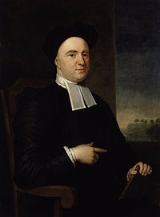
), was an Irish
philosopher whose primary achievement was the advancement of a theory he called "immaterialism" (later referred to as "subjective idealism
" by others). This theory denies the existence of material substance
and instead contends that familiar objects like tables and chairs are only idea
s in the mind
s of perceivers
, and as a result cannot exist without being perceived.
Our youth we can have but to-day,We may always find time to grow old.![]()
[Tar water] is of a nature so mild and benign and proportioned to the human constitution, as to warm without heating, to cheer but not inebriate.![]()
That there is no such thing as what philosophers call material substance, I am seriously persuaded: but if I were made to see any thing absurd or skeptical in this, I should then have the same reason to renounce this, that I imagine I have now to reject the contrary opinion.![]()
Doth the reality of sensible things consist in being perceived? or, is it something distinct from their being perceived, and that bears no relation to the mind?![]()
Seeing therefore they are both [heat and pain] immediately perceived at the same time, and the fire affects you only with one simple, or uncompounded idea, it follows that this same simple idea is both the intense heat immediately perceived, and the pain;and consequently, that the intense heat immediately perceived, is nothing distinct from a particular sort of pain.![]()
Since therefore, as well those degrees of heat that are not painful, as those that are, can exist in a thinking substance; may we not conclude that external bodies are absolutely incapable of any degree of heat whatsoever?![]()

